- Home
- Vicki Delany
Juba Good Page 2
Juba Good Read online
Page 2
“Something bothering you, man?” Peter asked.
My toast popped up. I began spreading a thick layer of peanut butter. Love peanut butter.
The door opened. Orange dust blew in along with Nigel, a Brit. A short, bald, pasty-faced guy, arms and chest thick with muscle.
Nigel grunted greetings and headed straight for the fridge. He pulled out a can of Coke. “A killing last night,” I said, answering Peter’s question. “A woman. Down by the river.”
Joyce looked up. “Raped?”
“No sign of it. It’s the fourth one like it this month.”
Her mouth twisted and she shook her head. She glanced at her watch.
“I gotta go. Fill me in later.” She folded down the corner of a page and got to her feet. She stuffed the book into her pocket.
“Hooker?” Peter asked as the door slammed shut after Joyce. His eyes remained fixed on the TV.
“Probably.”
“Occupational hazard.”
I felt a tightening in my gut. “Even a cheap hooker doesn’t deserve to be slaughtered like a pig.”
“Then she shouldn’t be hooking.”
“They don’t always have a choice, you know.” Nigel took out a second can. “Husband dead, family to support.”
“Save it, mate,” Peter said. “I’ve heard it all before. Hooking’s easier than working in a shop or washing dishes. Pay’s better too. I’ve got no tears for them.”
I’d heard it all before too. The threat of rape or murder shouldn’t be part of the job. No matter what type of job it is.
But I didn’t feel like arguing. I ate my toast.
I went back to my container. I had a long-standing tennis date with a Dutch diplomat named Donald.
I grabbed my racket and headed out.
My room was next to Sven’s, a cop from Sweden. Sven was sitting on a plastic chair in the shade of a mango tree. Barely past noon and he was already sucking on a brown bottle.
But he wasn’t working, so not my concern.
“Morning,” I said. Just to be friendly.
He grunted. Typical.
I stopped in front of him. I told him about the killing the night before. Asked him to keep an eye out when he was next on patrol.
“Never would have thought of that,” he said. “Is that what they consider in Canada to be an original idea?”
I didn’t rise to the bait. “Just mentioning it. Ask your partner to be on the lookout too.”
“Yeah, we’ll look out for hookers. Keep them all nice and safe.” He took another slug of his beer.
I walked away. I sometimes wondered why Sven had taken this post. He hid it well, but he didn’t seem overly fond of Africans. Nor of women, come to think of it.
Most of the guys and the few women posted here get on fine. They’re a good bunch of people. Gave up career and family for a year to try to help a struggling country. We’re all far from home, living in rough conditions. We try hard to make it work. But there’s one in every bunch. Sven was ours.
As usual, Donald whipped my ass at tennis. Instead of our usual beer after the game, Donald had to leave for a meeting. I planned to head back to the UN compound. I’d grab an early supper and read for a while. Then it would be time to meet Deng for another night on the streets.
Instead, I found myself driving to the police station near the water tanks.
The place was barely controlled chaos. I’d found in my time here that things might look out of control, but somehow they made it work. Juba good, we call it.
I knew the clerk at the front desk. He sat at a large black ledger, making note of anyone who came in with a complaint or an inquiry. Not many did.
“Hi, Edward,” I said. “Busy?”
“Yes,” he replied. There wasn’t a civilian in sight. Most of the police here knew me, and they paid me no attention.
“A woman was killed last night,” I said. “Has anyone come in asking about her?”
Edward shrugged. I glanced at his book. The surface was unmarked. He didn’t bother to flip back through the pages to check. His cell phone rang, and he pulled it out of his shirt pocket. He began to talk.
I leaned across him and turned the book around. I flipped the page. The latest entry had been at noon yesterday.
I should have known I was wasting my time. I left the building. I sat in the UN SUV, air-conditioning running hard, and thought. I could try the hospital. If anyone was looking for the dead woman, they’d be more likely to go there than to the cops.
I decided I couldn’t face it. Let her be. If no one else cared, why should I?
Chapter Four
But I’ve never been good at letting things go. Instead of heading home, I drove to the bend in the road. Blue water trucks were lined up around the corner, waiting their turn. The drivers squatted by the side of the road or stood in groups, gossiping. I left my vehicle at Notos and walked over. The workers and drivers paid no attention to me.
Garbage collection is an unknown concept in much of Africa. Scraps of paper blew in the dusty wind. Cardboard floated in the red puddles. Water bottles were stacked against walls where the wind had left them. I reached the spot where we’d found the woman. I squatted and pulled on a pair of latex gloves—to protect me, not the evidence. I poked through trash, leaves and twigs. I found a handle broken off a cooking pot and the leavings of stray dogs.
Then a flash of color caught my eye. I pulled a glittering red earring out of the rubbish. Glass. I thought back. Yes, the dead woman had been wearing one, and only one, red earring. I slipped it into my pocket. I started to push myself back up. A white square caught my eye. A business card, the sort you’d find anywhere in the world. Reasonably clean with a smudge of red dust in one corner. It hadn’t been there for long.
The card was for Blue Nile Restaurant. A place on the river, with tent fabric for roof and walls. It serves Middle Eastern food, mostly. I’ve been there once. I didn’t care for the cooking and never went back.
I tucked the card into my pocket beside the red earring. Then I went home to get ready for work.
Chapter Five
The main road through Juba features a row of streetlights. Good solid streetlights of the sort you’d see in any western city. Tonight, some drunk had found out just how solid they were.
By the time we got to the scene, the crowd of onlookers was growing. The car, a battered old Toyota Corolla, was buried headfirst in the base of a lamppost. The driver was buried headfirst in the dashboard. He had not bothered to put on his seat belt. Nor had his female companion. She was now little more than a bloody lump thirty yards farther up the road. The car was about twenty years old and did not come equipped with air bags. It might well have been stolen off a lot in Vancouver.
I told Deng we were here to do crowd control until the bodies were carted away. We would try to keep the curious from going through the wreck and the pockets of the deceased.
Shame about that streetlight. It would have cost a lot, in a country that didn’t have much to spend on luxuries.
A van arrived and the bodies were loaded up. Then everyone drifted away, and Deng and I got back into our truck. An old woman came out of nowhere and began sweeping the road with a homemade broom.
The rest of the night was quiet.
The next day, I decided to treat myself to lunch out. Back home, I have a reputation for being quite the good cook. When the kids were growing up and my shifts permitted, I did most of the cooking. Jenny’s a practical cook. Meat and potatoes, lots of pasta and hearty stews. I like to try new and different things. I love nothing more than to have dinner parties. To dress up, put out the good china and make my favorite recipes.
Here, I soon learned that fresh meat is something you don’t want to buy. It hangs in the market in the sun for hours, pecked by birds and covered in flies. Edible fresh greens are nonexistent. Every once in a while the grocers run right out of something. Last month, there wasn’t a pat of butter to be found for love nor money anywhere in Ju
ba.
The avocados here are great though, huge and as soft as butter. I eat a lot of avocados. Also a lot of peanut butter on white bread. I might even start to like white bread someday.
Today, I figured I deserved a treat. A late lunch at a nice place down by the river.
I signed out a car and drove to the Blue Nile.
The parking lot was mostly empty. The guard glanced at me as I drove in but otherwise didn’t bother to stir himself from his hut.
The wind was high, and tent fabric rustled in the breeze. I took a table by the water, taking care to stay away from a grove of mango trees. Flying mangos can do real damage. Young boys, all skin and bones and gigantic eyes, snatched the fruit. A guard shouted at them to get away. Two women from the kitchen moved through the trees, picking mangos off the ground.
My waitress was a short woman with dark brown, not black, skin. A foreign worker, likely Ugandan. She gave me a smile that didn’t touch her eyes. I ordered a beer and Nile perch with rice. It was nice in the shade, so I took off my hat.
When she brought the drink, I said, “I’m looking for a woman.”
A touch of disdain filled her eyes. I added quickly, “A particular woman, I mean. She might work here.” I described the dead woman. I pulled the red earring out of my pocket.
Something flashed across her face. She lowered her eyes. She shook her head and scurried away.
Past lunchtime, the restaurant was empty. A group of men, a mix of white and brown, sat at the bar. Judging by the noise, they’d been here for quite a while.
A different waitress brought my food. I described the dead woman. I got the same shake of the head and quick departure.
The beer was cold and the fish perfectly cooked. I watched the traffic on the river. Rickety rowboats, homemade canoes, a raft with a sail that might once have been a bedsheet, a rusty barge. A kayak rounded the corner. I recognized the two people paddling. Canadians who worked at the embassy. I grinned. Canadians and their canoes.
They were moving fast with the current, paddling more to steer than to provide speed. The kayak rounded the bend and disappeared.
“Can I get you anything more?” the waitress asked.
“No, thanks. Just the bill.”
We looked up at a burst of laughter from the bar. The female bartender had turned away from the men, her pretty face set in angry lines. My waitress threw the men a scowl that would curdle milk.
I put my money on the table, pinning it down with a salt shaker. I put my hat on my head and walked over to the bar. I stood at the far end from the group of drinkers. The bartender asked me what I wanted.
“Just to ask a question,” I said. I tried to sound friendly and not at all threatening. Again I described the dead woman and showed the earring. Again I got a negative reply. She hurried back to her customers.
I wandered around to the back of the building, following signs to the washrooms. I found them, and the kitchen, at the end of a dirt path.
Not being at all shy, I stuck my head in the kitchen door. Two men were resting on plastic stools, chatting. Their eyes widened at the sight of me.
“Hi,” I said. “I’m looking for someone who works here. Maybe you know her.”
Again I described the dead woman. I showed the earring.
“What are you doing in here?” an angry voice said behind me. I turned to see a man with short brown hair and a brown goatee. His cheeks were round and his chin wobbled. His skin was tanned the color of old leather. The permanent tan that meant a life spent in hot places.
“Ray Robertson. I’m with the UN, assigned to assist the local police.”
“I don’t care who you are, mate. Get the hell out of my kitchen.”
“I’m…”
“You’re bothering my staff, is what you’re doing. The girls complained about you. Get lost, and don’t come back.”
That took me aback. The staff had nothing to complain about. Maybe they didn’t like my question. Maybe their boss didn’t like my question.
“This is a police investigation.” I tried to sound as if I had some authority here.
“Rubbish. You’re just interfering. Get out.”
“She’s South Sudanese. Very pretty. I think this belongs to her.” I pulled the earring out of my pocket.
“I’ve never seen that piece of junk before. You’d better not be implying I run a whorehouse here.”
“I’m not implying anything. I’m asking a simple question.”
“I’m answering it. Get the hell out of my place.”
“Maybe you’ve seen her,” I said. Sometimes I don’t know when to quit.
With a roar, he came at me. I’d seen his intention in his eyes the moment before he moved. I ducked. I heard the air move as his fist flew past my face.
The cooks leapt to their feet and scattered. My waitress stood in the doorway. Her eyes were round and white in her dark face. She screamed.
I came back swinging. The man squealed. He tried to get out of the way, but he was too slow. Not used to hitting someone who would fight back, I thought. I landed a solid punch in the middle of his flabby belly. He gasped, let out a puff of air and bent over. I stepped back, startled at what I’d done.
Then strong arms were on mine. I was marched out of the kitchen. Two security guards. Tall and lean. The sort of leanness that means hard and fast. They didn’t try to beat me up or sneak in a punch or two. Just frog-marched me down the path to the parking lot. They shoved me against my vehicle and then stood back, watching me. They hadn’t said a word.
“I get the point,” I said. A gust of wind ruffled my hair. Of which I don’t have much. I’d lost my hat in the scuffle. I liked that hat. The guards turned and walked away.
The little waitress came running down the path. She waved my hat toward the guards. They nodded and she approached me. Keeping her eyes down, she held the hat out.
“Thank you,” I said.
“I know her,” she said, her voice very low. “Judy. She works here, in the kitchen, washing dishes. At night, sometimes she comes back. With men. Men like”—she tossed her head toward the bar—“those ones.”
She slipped away. I got into my car and drove home.
Chapter Six
I had that night off. I’d arranged to meet some visiting Canadian army guys at Notos for dinner.
The place was packed when I arrived. Shirley was behind the bar. Jazz was playing. Cooks tended fires. Waitresses carried trays of food. Spices filled the warm night air. Jake and Ron waved when they saw me come in. They already had bottles of local beer open in front of them. Marlene greeted me with a wide smile and took my order. I thought how different this place was from the Blue Nile.
Two men sat at the table next to ours, devouring pizza. One man was as white as a piece of paper. He had pale blond hair and eyes the color of Arctic ice. The other was jet black. The black man said something and the white one laughed.
Maybe this country had promise after all.
We ordered our food and were catching up on the news when a group of six men arrived. They swaggered in, puffed up with their own self-importance. Government officials. I recognized two senior police officers.
Marlene rushed to serve them. Her real smile was gone, replaced with a tight one. A flash of fear filled her warm brown eyes.
The men made a big show of laughing too loud, shouting for drinks. One of them put his hand on Marlene’s ample butt. She flinched but did not pull away.
“Little Hitlers,” Jake muttered into his beer. “The curse of Africa.”
We went back to our food and conversation.
“Morning comes early,” Ron said at last. He waved for the bill.
The restaurant had largely emptied out. After making sure we all knew how important they were, the hotshots had quieted down. They kept Marlene on the go. I hoped they’d leave her a big tip. But I doubted it. Not unless they wanted something in return. Something more than good food and friendly service.
Jake and Ro
n started counting out their money. I saw the guy who’d been free with his hands push himself away from the table. He’d been watching Marlene most of the night. Now she was disappearing into the back, loaded down with dirty dishes.
The big man stood up and followed. The kitchen, I knew, was not in the same direction as the washrooms.
“Be right back,” I said.
The kitchen was accessed by an outside path. This is common in places where you don’t often worry about rain. And never about sleet or snow. The building was on one side of the path. A high concrete wall topped with razor wire was on the other.
I stood in the dark, listening.
A squeal of surprise. A soft grunt. Then a low cry, cut off.
“We’re leaving now,” I said loudly. I rounded the corner. “I wanted to say ’bye.”
The big man had tiny Marlene pressed up against the wall. His knee was between her legs and his right hand over her mouth.
“Gee, sorry,” I said, “Did I interrupt something?”
He stepped back. Marlene ducked out from under his arm. She adjusted her shirt, which had become untucked. “Ray!” she said brightly. “I’ll be right with you.”
She fled back to the lights of the bar.
The man looked at me. He said nothing.
“Have a nice evening,” I said.
I went back to our table. I suggested Jake and Ron have another beer.
After a couple of minutes, the big man returned. He was strutting and laughing too loudly. He did not sit down, and he and his friends soon left.
Chapter Seven
The encounter between Marlene and the government official played on my mind for a night. Sure, attempted rape happens anywhere. Far too often. But it bothered me that he’d try it in a public place. With a table of his pals a few feet away. Little Hitlers, indeed. It didn’t look good for democracy if the people were afraid of the officials.
Over the next few days, I pretty much forgot about it, as well as the murdered women. My departure and holiday with Jenny were fast approaching.

 Silent Night, Deadly Night
Silent Night, Deadly Night Coral Reef Views
Coral Reef Views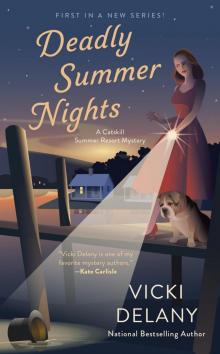 Deadly Summer Nights
Deadly Summer Nights Murder in a Teacup
Murder in a Teacup Whiteout
Whiteout Dying in a Winter Wonderland
Dying in a Winter Wonderland Tea & Treachery
Tea & Treachery Rest Ye Murdered Gentlemen
Rest Ye Murdered Gentlemen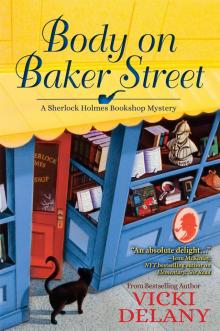 Body on Baker Street: A Sherlock Holmes Bookshop Mystery
Body on Baker Street: A Sherlock Holmes Bookshop Mystery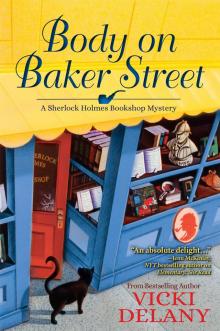 Body on Baker Street
Body on Baker Street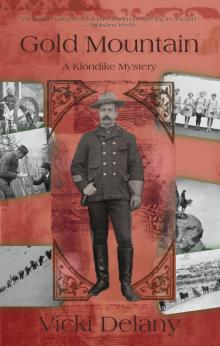 Gold Mountain
Gold Mountain Blue Water Hues
Blue Water Hues Hark the Herald Angels Slay
Hark the Herald Angels Slay Murder at Lost Dog Lake
Murder at Lost Dog Lake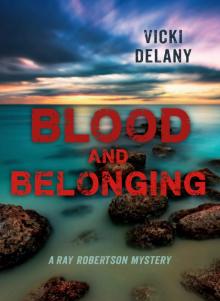 Blood and Belonging
Blood and Belonging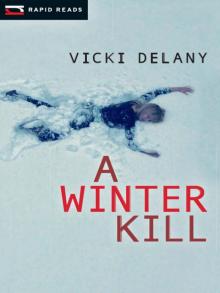 A Winter Kill
A Winter Kill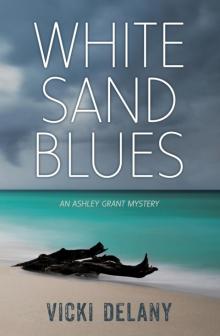 White Sand Blues
White Sand Blues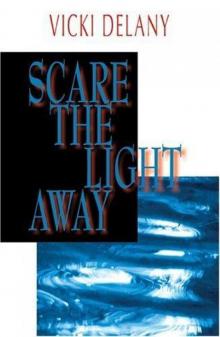 Scare the Light Away
Scare the Light Away Burden of Memory
Burden of Memory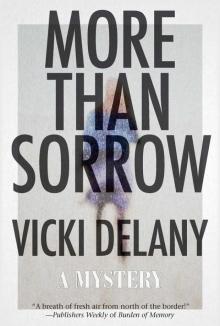 More Than Sorrow
More Than Sorrow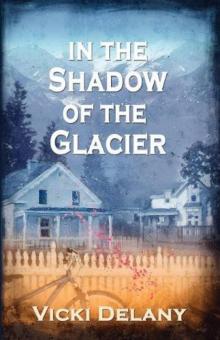 In the Shadow of the Glacier
In the Shadow of the Glacier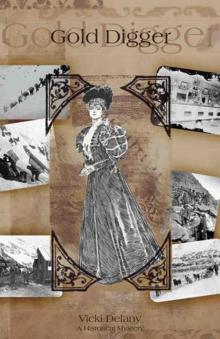 Gold Digger: A Klondike Mystery
Gold Digger: A Klondike Mystery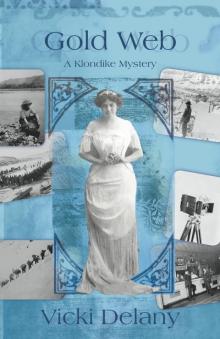 Gold Web
Gold Web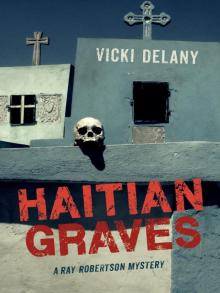 Haitian Graves
Haitian Graves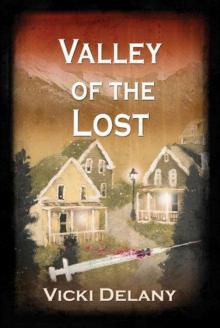 Valley of the Lost
Valley of the Lost We Wish You a Murderous Christmas
We Wish You a Murderous Christmas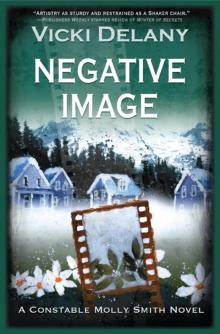 Negative Image
Negative Image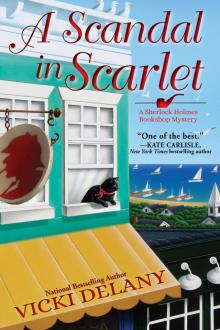 A Scandal in Scarlet
A Scandal in Scarlet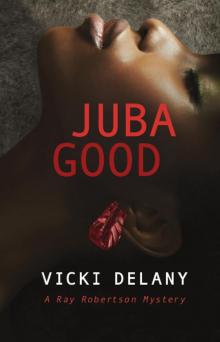 Juba Good
Juba Good Winter of Secrets
Winter of Secrets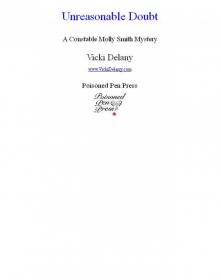 Unreasonable Doubt
Unreasonable Doubt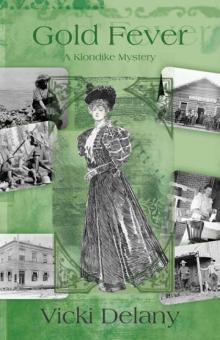 Gold Fever
Gold Fever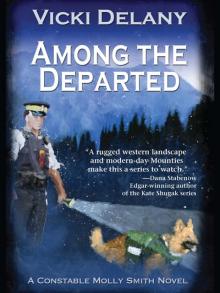 Among the Departed
Among the Departed Elementary, She Read: A Sherlock Holmes Bookshop Mystery
Elementary, She Read: A Sherlock Holmes Bookshop Mystery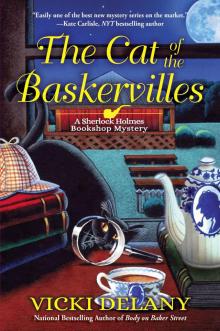 The Cat of the Baskervilles
The Cat of the Baskervilles